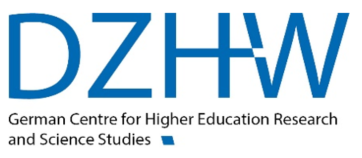Collaborating Institutions
The German Centre for Higher Education Research and Science Studies (DZHW)
The DZHW is a research institute based in Hanover and Berlin and funded by the German federal and state governments. The Centre carries out application-oriented empirical research in two main fields: research on higher education – including analyses of students’ and graduates’ experiences, issues relating to life-long learning, steering and funding – and research into the scientific world and academic organisations. As an international competence centre for higher education and science research, the DZHW conducts data surveys and analyses, provides research-based services for higher education and science policy, and makes a research infrastructure in the field of higher education and science research available to the scientific community.
The Robert K. Merton Center (RMZ)
The Robert K. Merton Center for Science Studies at Humboldt-Universität zu Berlin brings together researchers interested in understanding how science works. Through research, teaching, and transfer, work at the RMZ addresses questions of how scientific knowledge is currently produced as well as how science is embedded in societal processes. By being open to various theoretical and methodological perspectives, science studies not only aims to gain insights into the functioning of science, but also to help shape and critically accompany the relation between science and society.
Scholarly Communications Research Group (SCRG)
The SCRG is an interdisciplinary team of scholars based in Poznań, Poland, whose work crosses disciplinary boundaries in research on scholarly communication. In their work, they address research problems from transdisciplinary perspectives, drawing on classical works in sociology of science, higher education research, social studies of science, evaluation studies, critical university studies, and bibliometrics. They also focus on the questions surrounding multilingual writing for academic purposes from policy and practice perspectives, including how academic literacy is developed and valued across different higher education systems. Finally, they investigate the consequences of quantification, social construction of measurement and assessment procedures in research evaluation on academic labour, issues of the development of science, writing practices, and research systems in the global peripheries. The group is led by professor Emanuel Kulczycki at the Faculty of Philosophy of the Adam Mickiewicz University in Poznań.
Centre for Policy Research (DST-CPR)
The DST-Centre for Policy Research (DST-CPR), at Indian Institute of Science, was established in August 2014 with the objective of creating and strengthening the institutionalisation of policy research mechanisms in India. The major goal of DST-CPR is to study policies and develop mechanisms that can help increase the research impact of Indian institutions and thereby improve their position in global rankings. The Centre engages closely with different government bodies, private organisations and academic institutions of national and international repute to provide pragmatic and evidence-based recommendations for enhancing decision-making processes in Science, Technology and Innovation. In addition to collaborative projects, research publications and reports, the Centre is actively involved in various outreach, capacity-building and training activities. The Centre is also responsible for managing the Science, Technology and Innovation Policy fellowship programme of DST (DST-STI-PFP).
The Centre for Interdisciplinary Research on Justice (CIJ)
The Centre for Interdisciplinary Research on Justice (CIJ) is a R&D unit based at the Faculty of Law of the University of Porto (FDUP), focused on promoting and developing research in Law and Criminology, both nationally and internationally. CIJ started its scientific activity in 1999, with the recognition and financial support of the Foundation for Science and Technology (FCT), and, since then, has participated in national and international projects and has provided services to the national and international community that have had significant relevance and impact. It contributes actively to FDUP’s academic programs, particularly in postgraduate and master’s degrees in Law and Criminology, and hosts international visiting researchers. CIJ’s research is divided into four axes: (1) Rights, Society, and Power; (2) Business, Enterprise, and the Market; (3) Transnational Dynamics, Green and Digital Transition; and (4) Crime, Security, and Victimisation. Its research activity also focuses on the supervision of research projects, Master’s, Doctoral, and Post-Doctoral degrees, disseminating its results nationally and internationally through the organization of and participation in conferences. Currently, the CIJ consists of a team of 117 researchers, coordinated by Graça Enes (Director) and Rita Faria (Deputy Director), among others.
Scientific Advisory Board (SAB)
The SAB consists of five members: Professor Fernanda Beigel (National University of Cuyo and CONICET, Argentina, sociology of science), Professor Marie-Andrée Jacob (University of Leeds, UK, socio-legal studies and publication ethics), Professor Mary Dodge (University of Colorado Denver, USA, criminology), Professor Jesper Schneider (Aarhus University, Denmark, research integrity, quantitative science studies), and Professor Alberto Martín-Martín (University of Granada, Spain, information science and methods).





